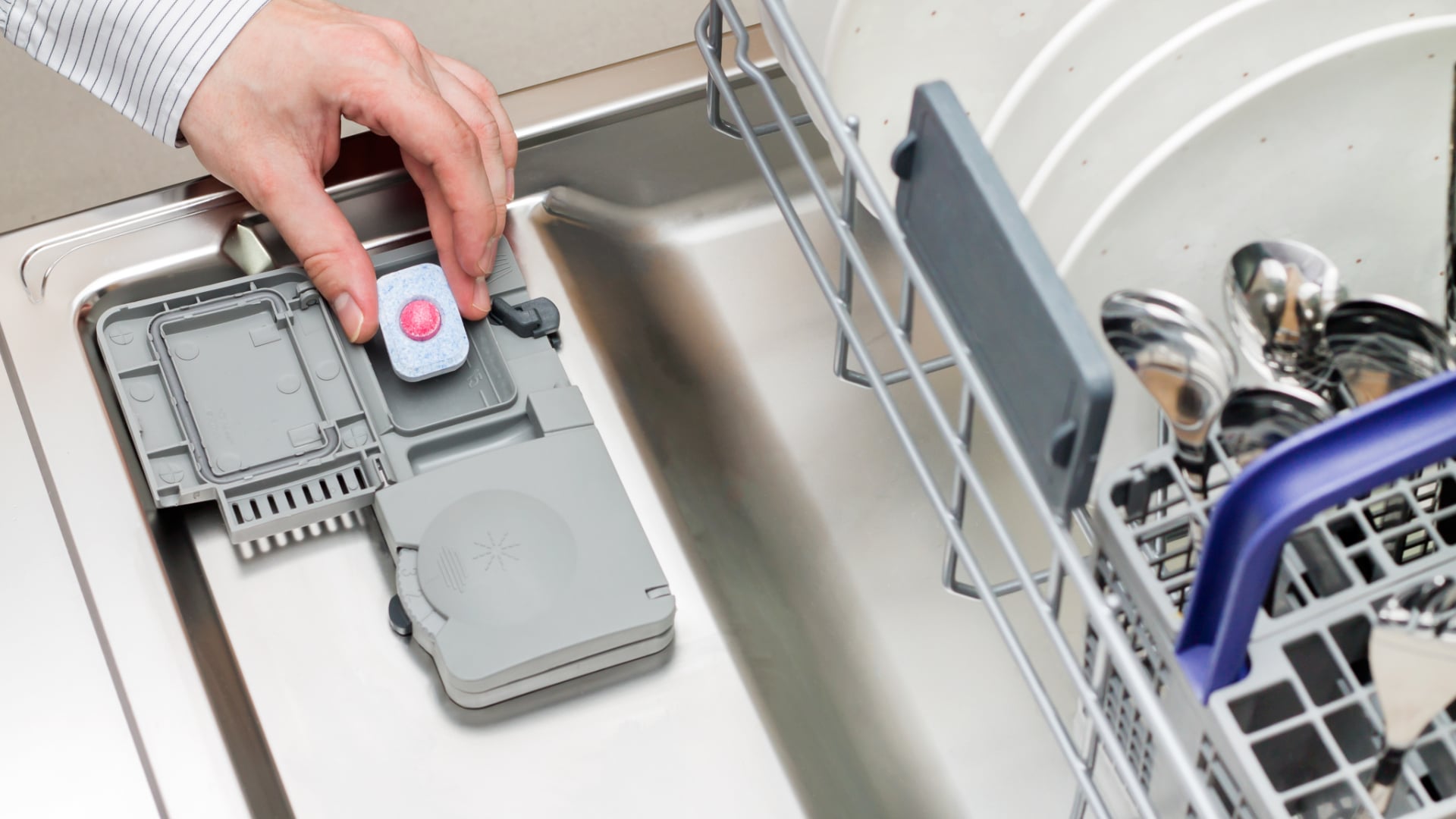What to Do When Your Dishwasher Detergent Won't Dissolve: Recognize and Resolve Issues
Dishwashers have become an indispensable part of modern life. However, ensuring the smooth operation of these machines can sometimes be less straightforward than expected. One common issue is when the dishwasher detergent fails to dissolve properly. we wrote a blog post on the reasons and solutions for when your dishwasher detergent won't dissolve.
Detergent Selection Matters
The problem of detergent not dissolving can often start with the quality of the detergent you've chosen. Ensure that your detergent is suitable for your dishwasher. Additionally, check whether your machine is designed for powder, liquid, or tablet detergents. Some machines may work better with powder detergents, while others may prefer tablets or liquid detergents. Make sure the detergent you're using aligns with your machine's requirements.
Check the Dosage
Using the correct amount of detergent is vital for effective dishwashing. Using too much detergent can leave residue on your dishes and hinder dissolving. Follow the recommended dosage as per your machine's user manual. Generally, it's advised to avoid excessive use of detergent.
Load the Machine Correctly
Proper loading of your dishwasher is important to ensure that detergent dissolves effectively. Large plates or containers may block the detergent from distributing evenly. When loading your dishes, ensure that they are placed to allow proper contact with the detergent. If the detergent compartment is jammed or obstructed, this can also hinder dissolution.
Pay Attention to Temperature Settings
The water temperature in your dishwasher can significantly affect detergent dissolution. Detergents typically dissolve better in hot water. Therefore, ensure that your dishwasher's water temperature is appropriate. Cold-water cycles may result in lower detergent dissolution. For optimal detergent performance, a minimum water temperature of 120°F (49°C) is recommended.
Clean Filters and Spray Arms
Filters and spray arms inside the dishwasher can become clogged with debris over time. This can prevent detergent from reaching your dishes effectively. Periodically clean the filters and inspect the spray arms. Refer to your machine's user manual for the cleaning process.
Guard Against Limescale Buildup
Limescale buildup within the dishwasher, particularly in the detergent compartment, can lead to dissolving issues. Regularly clean the interior of your dishwasher using limescale prevention products or specific cleaning agents. If you have hard water, consider using a water softener to prevent limescale buildup.
Seek Professional Help
If the above solutions don't resolve the issue or if dishwasher problems persist, consider seeking assistance from a technician. Detergent not dissolving can sometimes indicate more complex technical problems. A professional can diagnose and address intricate issues within your machine.
The problem of dishwasher detergent not dissolving can be frustrating as it hinders the cleaning process. However, by following the above suggestions and performing regular maintenance, you can resolve these issues and ensure that your dishwasher operates more efficiently. If these methods prove ineffective, seeking professional assistance is a wise step to prevent potential long-term problems. Keep in mind that the right detergent, proper dosage, and routine maintenance contribute to the efficient functioning of your dishwasher.
Optimize Dish Arrangement
The way you arrange your dishes inside the dishwasher can also affect detergent dissolution. Large plates or containers may hinder the proper distribution of detergent. Create a layout that ensures even detergent coverage for all your dishes.
Change Your Detergent
If the issue appears to be related to the detergent, consider trying a different brand or type. Low-quality or outdated detergents can lead to dissolving problems. Follow the recommended dosage and opt for a higher-quality detergent to resolve the issue.
Clean the Detergent Compartment
The detergent compartment can get clogged with residue over time. These blockages can prevent proper detergent dissolution. Regularly clean the compartment, and if possible, remove it for easier cleaning. Use hot water and a brush or cloth to clean it thoroughly.
Check the User Manual
Reviewing your dishwasher's user manual can sometimes help correct simple errors that cause detergent problems. The manual may contain crucial information on the correct dosage, usage recommendations, and your dishwasher's specific requirements. Go over the manual and follow the suggestions for using the machine correctly.
Do Not Delay Adding Detergent
Most dishwasher models require you to add detergent immediately after loading the dishes. Adding detergent too early can hinder the dissolution process. Be sure to add detergent right after arranging the dishes.
Ensure Proper Detergent Compartment Closure
If the detergent compartment's lid is not closed properly, it can lead to detergent dissolution issues. Ensure that the compartment's lid locks securely and that there are no obstructions.
Resolving the issue of dishwasher detergent not dissolving may require some trial and error. By following the above recommendations, you can overcome this problem and ensure that your dishes come out cleaner and shinier. If the issue persists or more significant technical problems arise, seeking professional technician assistance is advisable. Remember that proper detergent selection, correct dosage, and dishwasher maintenance contribute to efficient operation.
Change the Detergent Brand or Type
If the issue persists and seems related to the detergent, consider experimenting with a different brand or type. Sometimes, lower-quality or incompatible detergents can lead to problems with dissolution. Adhering to the recommended dosage and choosing a higher-quality detergent may help resolve the issue.
Clean the Detergent Dispenser
Over time, detergent dispensers can accumulate residue and become clogged. This can impede proper detergent dissolution. Regularly clean the dispenser, and if it's removable, take it out for thorough cleaning. Use hot water and a brush or cloth to ensure it's free from any obstructions.
Refer to the User Manual
The user manual for your dishwasher can be a valuable resource for troubleshooting issues related to detergent dissolution. It often contains essential information about the correct dosage, usage recommendations, and specific requirements for your dishwasher. Review the manual and adhere to its guidance for proper machine usage.
Don't Delay Adding Detergent
In most dishwasher models, it's essential to add detergent immediately after loading the dishes. Adding detergent too early or too late in the wash cycle can hinder dissolution. Make sure to add detergent promptly after arranging the dishes for optimal results.
Ensure Proper Detergent Dispenser Closure
A secure closure of the detergent dispenser is crucial to prevent detergent dissolution issues. Double-check that the dispenser's lid locks securely without any obstructions that might hinder its operation.
Solving the problem of dishwasher detergent not dissolving may require some experimentation and thorough maintenance. By following the recommendations provided, you can overcome this issue and ensure that your dishes come out cleaner and shinier. If the problem persists or if more significant technical issues arise, it's advisable to seek assistance from a professional technician. Keep in mind that proper detergent selection, correct dosage, and regular dishwasher maintenance play pivotal roles in ensuring efficient dishwasher operation.
Don't let unresolved detergent dissolution issues spoil your clean dishes. Take proactive steps and consider professional help when needed to keep your dishwasher functioning optimally and your kitchenware sparkling. Remember, a well-maintained dishwasher with the right detergent is the key to hassle-free dishwashing.








